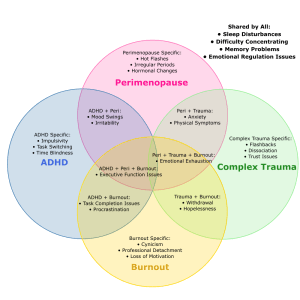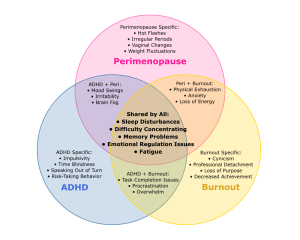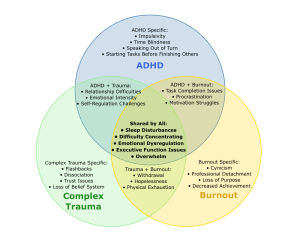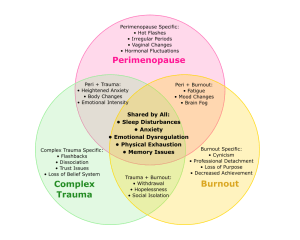Many women discover their neurodivergence later in life. This is often after years of misdiagnosis or struggling with unexplained challenges. The journey typically involves a constellation of symptoms that can be attributed to various conditions: anxiety, depression, burnout, or “just being lazy.” But for many women, these symptoms are actually manifestations of undiagnosed ADHD, complicated by hormonal changes, trauma responses, and chronic stress.
Women have historically been underrepresented in medical research, with women of color even more severely underrepresented. While boys are often diagnosed with ADHD due to their external hyperactivity, girls are socialized to be polite, often internalizing their hyperactivity and being misdiagnosed with anxiety instead. This socialization also leads many women to become expert maskers, mimicking “normal” behaviors they observe – a survival strategy that often leads to exhaustion.
The Overlapping Symptoms of ADHD, Trauma, Burnout, and Hormonal Changes
The Complex Web of Symptoms
To understand the intricate interplay between these conditions, let’s first look at how all four intersect:
This comprehensive visualization shows how these four conditions share many symptoms, making diagnosis particularly challenging. At the center, we see core symptoms that appear in all conditions: sleep disturbances, difficulty concentrating, memory problems, and emotional dysregulation. Understanding these overlaps is crucial for proper diagnosis and treatment.
Let’s examine each three-way intersection in more detail to better understand these relationships:
This visualization reveals how ADHD symptoms in women can be masked or exacerbated by hormonal changes during perimenopause. Many neurodivergent women can function under the radar until perimenopause begins. Estrogen significantly impacts serotonin and dopamine levels – neurotransmitters crucial for mood regulation and executive functioning. When estrogen levels drop during perimenopause, ADHD symptoms often intensify, bringing previously manageable challenges to the forefront.
When ADHD intersects with perimenopause and burnout, we see a particularly challenging combination. The executive function struggles common in ADHD can become more pronounced during perimenopause due to fluctuating estrogen levels. Add professional burnout – often a result of years of masking and overcompensating – and the symptoms compound exponentially. This combination frequently leads to increased anxiety, severe fatigue, and cognitive difficulties that can impact both personal and professional life.
The relationship between undiagnosed ADHD, trauma, and burnout is particularly significant. Years of living with undiagnosed ADHD can lead to chronic stress and trauma responses. Many women internalize their struggles as personal failures rather than recognizing them as symptoms of neurodivergence. This internalization, combined with constant masking, frequently leads to burnout and can create a cycle of trauma responses that further complicate diagnosis and treatment.
While this combination doesn’t center ADHD, it’s crucial to understand how these conditions can mask underlying neurodivergence. Women often receive these diagnoses first, leaving their ADHD unrecognized and untreated. Understanding how these conditions interact with ADHD is essential for proper diagnosis and treatment.
Key Understanding Points:
- Estrogen impacts dopamine and serotonin levels, affecting ADHD symptoms
- Masking neurodivergent traits can lead to both trauma responses and burnout
- Perimenopause can unmask previously manageable ADHD symptoms
- Complex trauma can develop from years of unrecognized neurodivergence
- Each condition can amplify the symptoms of the others
Navigating Your Neurodivergent Journey: Action Steps and Resources for Neurodiversity in NJ
- Medical Advocacy
- Seek neuro-affirming and trauma-informed healthcare providers
- Keep a symptom diary to track patterns, particularly around hormonal cycles
- Don’t hesitate to get a second (or third) opinion – research shows women often need to see multiple providers before receiving an accurate ADHD diagnosis
- Request comprehensive hormone panels that include estrogen, progesterone, and thyroid function
- Treatment Approaches
- Consider an integrative treatment plan that may include:
- Medication (both for ADHD and hormone regulation if needed)
- CBT or DBT specifically adapted for Neurodivergence, and trauma- if appropriate
- Hormone therapy when appropriate
- Lifestyle modifications
Remember: medication isn’t a character flaw – it’s a tool for managing brain chemistry!
- Support Systems
- Connect with neuro-affirming therapists
- Join support groups (online or in-person) specifically for neurodivergent women
- Follow social media accounts for neurodivergent women, some of my favorite are @adhd_love, @adhd_chatter_podcast, and @adhd_with_drjen all on Instagram
- Build a community of other neurodivergent women who understand your experiences
- Workplace Strategies
- Learn about workplace accommodations for ADHD
- Consider disclosure if it feels safe and beneficial
- Implement systems that work with your brain, not against it
- Set boundaries around masking behaviors at work
- Lifestyle Adjustments
- Create routines that support executive function
- Implement body-doubling strategies when needed
- Use external organizing systems (digital or physical)
- Practice radical self-acceptance rather than constant self-correction
- Processing the Diagnosis
- Allow yourself to grieve lost time and missed opportunities
- Recognize that diagnosis isoften both a relief and a challenge
- Reframe past experiences through your new understanding
- Celebrate your resilience and survival strategies
- Moving Forward
- Start unmasking in safe spaces first
- Learn to identify and honor your natural rhythms
- Embrace your neurodivergent traits as strengths
- Connect with others who share similar experiences
- Hormone Awareness
- Track perimenopause symptoms alongside ADHD symptoms
- Work with healthcare providers who understand the connection
- Consider hormone-sensitive ADHD treatment adjustments
- Prepare for possible symptom fluctuations during hormonal changes
Thriving as Your Authentic Neurodivergent Self
Remember: Neurodivergence isn’t something to fix – it’s a different way of experiencing and interacting with the world. The goal isn’t to become “normal” but to build a life that works with your unique brain wiring. By understanding these intersections and implementing appropriate support strategies, women can better navigate their neurodivergent journey and find ways to thrive that align with their authentic selves.
Ready to Begin Working with a Neurodivergent Affirming Therapist near Somerville NJ?
Your experiences are real, valid, and worthy of understanding. If this blog resonated with you, don’t stop here—take action. Whether it’s seeking a neuro-affirming provider, connecting with a supportive community, or adjusting your daily routines to better suit your brain, every step forward is a step toward thriving.
Start today. The path to self-discovery and self-acceptance begins now. You are not alone!
- Reach out to schedule a consultation with one of our neuro-affirming therapists
- Make your first appointment at Brave Minds Psychological Services.
- Begin to feel the change of working with an affirming therapist!
Begin Counseling in Branchburg, NJ
At Brave Minds, we understand the unique challenges faced by neurodivergent women and the intersections of various mental health conditions. In addition to our specialized support for ADHD and related issues, we offer a range of services tailored to meet the diverse needs of our clients. We provide a wide range of mental health services for adults, teens, and children. This includes therapy for postpartum concerns, food allergy-related anxiety, EMDR therapy, and more. Services are available both in person at our Scotch Plains and Branchburg, NJ offices and through telehealth counseling for residents across New Jersey.
We are committed to providing neurodivergent-affirming therapy that acknowledges and addresses the unique experiences of women. If you or someone you know could benefit from any of these services, please reach out to us today.







